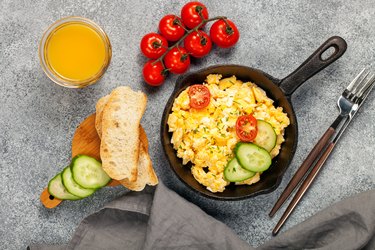
There are often times when medical issues arise and easily digestible protein is ideal. Issues such as stomach flu, intestinal surgery, heartburn, diarrhea, indigestion and irritable bowel disease can make digesting protein a difficult and uncomfortable task.
Fortunately, there are plenty of high-protein foods that are easy to digest. While it may be tempting to simply try to avoid foods high in protein, this may not be the best solution for your health. Protein is one of three important macronutrients that help build and fuel the body. Macronutrients are needed in large amounts in the body to provide calories — the energy needed for life processes.
Video of the Day
Video of the Day
Why Is Eating Protein Important?
Protein contains the necessary components to build human structures and helps form everything from skin and hair to blood and muscle. Protein is crucial in tissue repair from an injury or a stressor like weight lifting because they contain amino acids that synthesize hormones and neurotransmitters, and act as the building blocks of tissues. Nine amino acids are not made within the human body and are only obtained through food.
When it comes to feeling full and satisfied with meals, protein is the top choice for reducing hunger and increasing satiety. According to a November 2014 review published in the journal Nutrition and Metabolism, protein digestion triggers hormones that signal fullness and satisfaction.
Protein also helps maintain glucose homeostasis, which prevents sugar spikes that can cause hunger and energy crashes. Depending on your goals and activity level, the American Council on Exercise suggests obtaining between 10 and 35 percent of your daily calories from protein.
Read more: 13 Surprising Vegetarian Sources of Protein
Proteins also form important enzymes, as well as antibodies, that help fight infections. Animal proteins contain all of the essential amino acids not made in the body, but it is also possible to obtain essential amino acids from a plant-based diet by combining foods for easily digestible meals.
Choose Lean Animal Proteins
Choosing lean cuts of meat, without the skin, is the best option if you have poor protein digestion. A July 2016 review by the Middle East Journal of Digestive Diseases recommends avoiding regular consumption of red meats, fried foods and fast foods. Boneless, skinless chicken breast is an easily digestible protein that is rich in nutrients potassium, magnesium and zinc, as well as vitamins B12, E and K.
Eggs are also an easily digestible protein source. The white and yolk are typically well-tolerated and are consistently nutrient-dense. The bioavailability of protein in eggs is very high, making them fantastic high-protein meals for those with digestion concerns.
Eggs are also inexpensive ,and full of vitamins and minerals like calcium, magnesium, iron, vitamins B6 and B12, folate, and vitamins A and D, to name a few.
Choose Plant Protein Carefully
Plant proteins are not as bioavailable as animal proteins, and require careful planning and pairing to provide the essential amino acids needed by the body. It is possible to combine plant proteins in order to obtain the necessary amino acids. Additionally, there are some methods of increasing the digestibility of plant proteins.
Read more: How Much Spirulina Should I Consume?
According to a June 2018 study in the American Journal of Clinical Nutrition, spirulina, mung beans, and chickpeas are among the most easily digestible proteins for plant-based diets. Hulling the mung beans can further increase digestibility and protein absorption. Spirulina is a dried seaweed, and it is very nutrient-dense. It is a good source of iron and magnesium and an excellent source of copper, thiamin, and riboflavin.
- American Council on Exercise: "Macronutrients, Micronutrients, and Water"
- Nutrition and Metabolism: "A High-Protein Diet for Reducing Body Fat: Mechanisms and Possible Caveats"
- American Council on Exercise: "How to Determine the Best Macronutrient Ratio for Your Goals"
- Middle East Journal of Digestive Diseases: "Diet and the Gut"
- MyFoodData: "Nutrition Facts for Lean Chicken Breast"
- Cholesterol: "The Impact of Egg Nutrient Composition and Its Consumption on Cholesterol Homeostasis"
- MyFoodData: "Nutrition Facts for Eggs"
- American Journal of Clinical Nutrition: "Measurement of Protein Digestibility in Humans by a Dual-Tracer Method"
- MyFoodData: "Nutrition Facts for Spirulina"